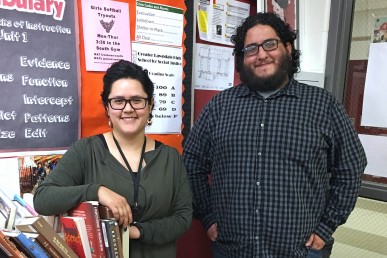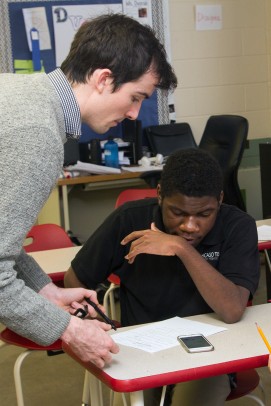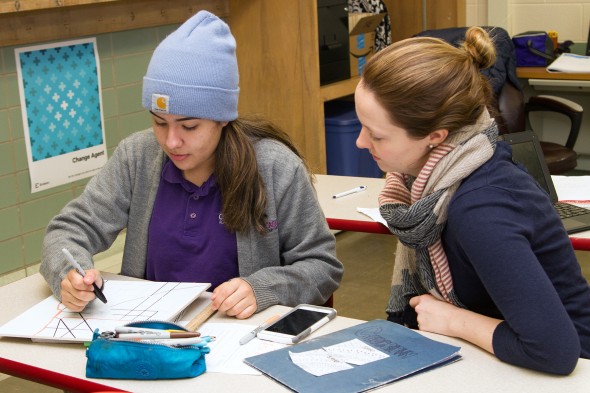Alumni help student teachers learn the ropes
Julie Peters knows that the relationship between a teaching candidate and their cooperating teacher can make or break the student teaching experience.
“Your individual students may drive you crazy,” said Peters, associate director of the Teaching of History Program, recounting what she tells graduate and undergraduates in her student teaching seminars, HIST 475 and 476. “You may have a class that you don’t feel you can manage, but if you’re really going to have a problem student teaching, it’s probably going to be with your cooperating teacher.”
She explained that experienced teachers are like mentors for student teachers — helping them put teaching and classroom-planning theories into practice, transitioning them into the full-time teacher of record and preparing them for the edTPA, a performance-based assessment that’s required for licensure to teach in Illinois.
But mentors who aren’t fit for the job can be “overbearing, give too much support, not give enough support, be overcritical, passive aggressive,” said Peters. “All of these things can happen. It’s a real delicate balance.”
That’s why knowing who mentors are and what their teaching style is like before placing teaching interns is a plus — it allows Peters to match teams by considering what personality traits, life experiences, interests and other compatibility measures could mix well. Of course, because it’s already difficult to find schools and teachers willing to participate, that doesn’t always happen. Sometimes, administrators are just grateful to get a school. “It’s hard to place people,” Peters said. “But this is an essential, essential piece.”

UIC alumna Yamali Rodriguez-Gruger and current student Saul Garcia work together at Social Justice High School in Little Village.
This semester, for the first time in the program’s history, seven UIC alums volunteered their service and classrooms to their alma mater — and she knows them all.
“They were my students, with the exception of one,” Peters said, before adding that she taught with the seventh at her first teaching job.
“It was almost like I could hand pick them,” she said. And, for the most part, she did. “I was able to reach out to almost all of these cooperating teachers, who are former grads, and say ‘Hey, I’ve got this student, do you think you could take them at your school?’”
For Yamali Rodriguez-Gruger, a social studies teacher at Social Justice High School in Little Village, the answer was yes.
“I’ve always felt that it’s important to give back,” said Rodriguez-Gruger, a graduate of the Bachelor of Arts in the Teaching of History program (BAT). She also has a master’s in instructional leadership from UIC and has been teaching in Chicago Public Schools for the past 11 years.
“Just because I became a successful teacher doesn’t mean that my work is done,” she said. “My duty, now, is to help other teachers build their craft.”
Saul Garcia, a student in the BAT program, led at least three classes during the semester. He’s grateful that they were matched.
“Yamali reminds me of my older sister,” Garcia said. They share a lot of common ground. Besides having conversations about the teaching program’s professors and curriculum, they both participated in many of the same student organizations and have a passion for social justice and activism.
For Garcia, the most important thing about the match is that Rodriguez-Gruger understands the challenges he’s had to face as a UIC student teaching in a classroom for the first time.

Jack Snyder (left), a master’s student, is Habercorn’s student teacher at Chicago Technology Academy in University Village.
“As much as professors try to prepare you for what it’s like, it’s nearly impossible for them to cover everything,” Garcia said. “So, we really need someone that’s been through it before to guide us and help us understand things, because if you come in without that, you’re more likely to drown.
“Yamali isn’t letting me drown, but at the same time, I have freedom. I feel like I’m not alone here.”
Shannon Haberkorn, a teacher of social science and world geography who graduated from the BAT program in 2010, knows what it’s like to be on the other end of that spectrum with a cooperating teacher.
“When I was student teaching, I had an experience where I had to seek out other adults for support,” she said.
“I don’t have that struggle,” added Jack Snyder, a master’s student and Haberkorn’s student teacher at Chicago Technology Academy in University Village.
Snyder, who taught ecology and geology before coming to UIC, likes the project-based learning model that Haberkorn and other Chicago Tech teachers use.
“At other schools, there was more of a regimented curriculum where it would be like a textbook this day, lecture this day, and this is a lot more free-form, student-centered and student-driven,” Snyder said.
He’s graduating next month, and the practice and feedback he’s gotten from student teaching at Chicago Tech has increased his confidence in creating lesson plans.
“I’m improving,” he said.
Haberkorn said cooperating teachers benefit from the matches, too.
“Julie is thoughtful about how she does her pairings,” Haberkorn said. “I appreciated some of the perspective Jack brought as a [Master’s of Arts in the Teaching of History] student. The skills he brought were really helpful to our students.”
Peters hopes to have more alumni participate.
“This is the sweet spot — this is where I want the program to be from now on,” she said.

